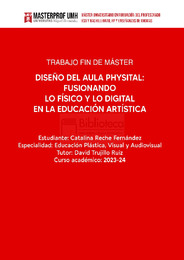Please use this identifier to cite or link to this item:
https://hdl.handle.net/11000/33034Full metadata record
| DC Field | Value | Language |
|---|---|---|
| dc.contributor.advisor | Trujillo, David | - |
| dc.contributor.author | Reche Fernández, Catalina | - |
| dc.contributor.other | Departamentos de la UMH::Arte | es_ES |
| dc.date.accessioned | 2024-09-10T10:44:30Z | - |
| dc.date.available | 2024-09-10T10:44:30Z | - |
| dc.date.created | 2024-06 | - |
| dc.identifier.uri | https://hdl.handle.net/11000/33034 | - |
| dc.description | Especialidad: Educación plástica, visual y audiovisual | es_ES |
| dc.description.abstract | La fusión entre entornos físicos y digitales en el contexto de la educación en la actualidad, es una posible solución adaptativa para afrontar los numerosos desafíos a causa de los continuos procesos de evolución digital en la sociedad. Primero por la necesidad imperativa de una realidad tecnológica inevitable y segundo por la posibilidad de personalizar el aprendizaje a través de las herramientas innovadoras que se ajusten a las necesidades individuales de cada estudiante, facilitando así un aprendizaje más inclusivo y equitativo. Esta hibridación entre lo físico y digital se utiliza en este proyecto bajo el concepto “physital”, con el objetivo de diseñar un aula physital enfocada a las enseñanzas artísticas, que sea eficiente y sostenible y además tenga capacidad de explorar y aportar nuevas perspectivas pedagógicas integrando tecnologías adaptativas y herramientas de accesibilidad universales para que todo el alumnado pueda participar y superar eficazmente las etapas educativas. | es_ES |
| dc.description.abstract | The fusion between physical and digital environments in the context of education today, is a possible adaptive solution to face the many challenges caused by the continuous processes of digital evolution in society. Firstly because of the imperative need of an inevitable technological reality and secondly because of the possibility of personalizing learning through innovative tools that adjust to the individual needs of each student, thus facilitating a more inclusive and equitable learning. This hybridization between the physical and digital is used in this project under the concept “physital”, with the aim of designing a physital classroom focused on artistic teachings, which is efficient and sustainable and also has the ability to explore and provide new pedagogical perspectives by integrating adaptive technologies and universal accessibility tools so that all students can participate and effectively overcome the educational stages. | es_ES |
| dc.format | application/pdf | es_ES |
| dc.format.extent | 40 | es_ES |
| dc.language.iso | spa | es_ES |
| dc.publisher | Universidad Miguel Hernández de Elche | es_ES |
| dc.rights | info:eu-repo/semantics/openAccess | es_ES |
| dc.rights.uri | http://creativecommons.org/licenses/by-nc-nd/4.0/ | * |
| dc.subject | Inclusividad | es_ES |
| dc.subject | Innovación pedagógica | es_ES |
| dc.subject | Tecnologías emergentes | es_ES |
| dc.subject | Accesibilidad | es_ES |
| dc.subject | Sostenibilidad | es_ES |
| dc.subject | Arte | es_ES |
| dc.subject | Interactividad | es_ES |
| dc.subject | Aprendizaje personalizado | es_ES |
| dc.subject.other | CDU::3 - Ciencias sociales::37 - Educación. Enseñanza. Formación. Tiempo libre | es_ES |
| dc.title | Diseño del aula physital: fusionando lo físico y lo digital en la educación artística | es_ES |
| dc.type | info:eu-repo/semantics/masterThesis | es_ES |

View/Open:
TFM RECHE FERNANDEZ, CATALINA.pdf
7,25 MB
Adobe PDF
Share:
.png)
